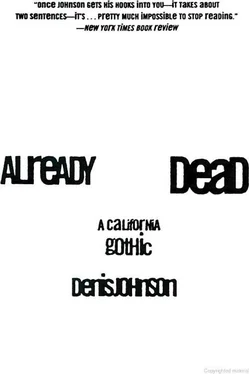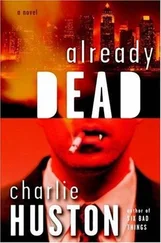Navarro followed him along a line of several other cars and into the house through the door of what turned out to be the kitchen, where an elderly man in crisp blue overalls sat at the wooden table, writing on a pad and puffing a cigarette. “Why wasn’t I called!” the new arrival shouted at him.
Already Dead / 147
The man kept one finger on his notebook and looked up and back and forth between the two of them, as if unsure which one had spoken.
“Weren’t you called?”
“Well, when did it happen? I mean, who was here ?”
“Just Donna,” the older man said, and then shouted, “Donna!” while vigorously stubbing out his smoke.
He reached into an orange kit bag on the floor beside him and took out a small bottle with a rubber diaphragm over its top, the sort for keeping injectable liquids sterile. He raised it up three inches before his face and, peering closely at its label, jotted some more notes on his pad.
Navarro was used to taking charge at the scenes of crimes and accidents. But as far as he could tell this was not one of those. He cleared his throat and removed his cap.
“Be right with you, Officer,” the man said, and finished writing and set the bottle of medicine down.
“John Navarro, Point Arena Police. Would you be the physician?”
“Henry Schooner, M.D. Everybody calls me Doc. I requested your presence,” the doctor said.
“And you must be family,” Navarro asked the other.
“I’m sorry — how do you do, Officer. I’m Nelson Fairchild,” the man said. And, after a breath, added, “Junior.” He addressed the doctor: “Is my father really dead?”
“Yes,” Schooner said. “Donna found him about eleven, when she thought he was calling for her. But by that time he was well gone.”
“Well gone ? What does that phrase mean?” Schooner said, “It means cold. He was cold to the touch. Donna!” he called out again.
“Well gone ,” Fairchild said.
“What’s in the bottle there?” Navarro asked.
“Morphine sulfate,” Schooner told him.
“Was he in pain?”
“Considerable pain, for certain. He had colon cancer and refused surgery. But this is the only bottle he had, and it’s full to the brim. Donna says she never administered any. He wouldn’t take it.” Navarro figured this was Donna herself coming downstairs and into the kitchen, a woman in her late middle age, freshly groomed and dressed, gripping a hairbrush and gazing at the three of them with her comprehension running about ten percent. “Excuse me—
148 / Denis Johnson
yes?” she said. She seemed at that moment to discover the hairbrush in her hand, and she laid it on the kitchen counter and looked at it.
Navarro had seen hundreds of people in this state of mind in the middle of the night at the end of someone’s life.
“Mrs. Fairchild, I’m John Navarro of the Point Arena Police.”
“Winslow,” she corrected him.
“Winslow?”
“Donna Winslow,” she said.
Schooner said, “I was telling them how you found him, Donna.”
“I heard Bill at the door and woke up and went upstairs,” she said.
“I thought it was Nelson calling me. But Nelson was gone.”
“ Well gone, in fact,” Fairchild said, and then said, “Excuse me, boss,” helping himself to one of the doctor’s Camels. Navarro realized only at this point that Fairchild must be quite tipsy if not completely wrecked.
“Ms. Winslow, did you say somebody was at the door when you woke up?” Navarro asked her.
“I think Bill’s around here someplace,” she said.
“Bill,” Navarro repeated.
“My brother,” Fairchild said, and asked Donna, “Where is he?”
“He was out back,” she said, “cutting up a doe.” She looked around among the three of them, but they said nothing. “Otherwise it’ll turn,” she added with an apologetic air.
Navarro leaned over the kitchen sink to look out the window and down into the darkness one story below him, where a man in a raincoat entered and left the dim ellipsis of an electric lantern, butchering a deer.
He had the carcass stretched out on boards between two sawhorses, with a heap of skin on the left and entrails on the right. Navarro believed he was making small sounds with his voice. “Hm! Hm! Yep!” For the joints he used a machete.
Now Navarro smelled sour wine — Nelson’s breath, in fact. The tall man stood at his shoulder shouting down, “Bill! Will you get up here right away please? For Christ’s sake.”
“Would you excuse me now?” Donna asked. The men looked at her expectantly but she said no more, neither did she leave the room. She turned a chair sideways from the table, drew a paper sack toward her on the floor and put her feet flat on either side of it, reached in and began the process of snapping string beans, tossing the stems into the yellow trash can an arm’s length away. For about thirty seconds they Already Dead / 149
watched her, until she paused and asked, “Should I be doing this?” Schooner put his hand out across the table, a friendly gesture that didn’t quite reach. “If it comforts you.”
“There’ll be people around tomorrow, and they’ll have to eat.” She resumed snapping the beans.
The brother turned up at the kitchen door now, minus his raincoat, which hadn’t kept blood from spattering his T-shirt. He pressed down the latch with an elbow and wrestled the screen door open with the toe of his boot. Navarro moved to hold it open for him. Nelson came a step forward as if to offer his brother a sentimental embrace, but stopped short; and so did William, with his gory hands upraised to keep from smearing things.
He said to Nelson, “I was on my way here. I felt it coming. I was seconds too late.”
Navarro gave him a nod but got no acknowledgment. So this was the W. Fairchild whose letters, the latest addressed to Navarro personally, took up three-fourths of the “Federal” file at the Point Arena Police station. W. Fairchild stepped to the sink and turned the tap carefully with his pinky finger and started washing up.
Nelson stuck his face in his brother’s face. “A doe, did you say? I thought you wouldn’t shoot a doe.”
“I didn’t. It was dead by the road.”
“Why wasn’t I called right away?”
Bill turned off the water and looked confused and said, “Winona’s was the last place we tried.”
“Found me in the last place you looked?”
“It was the last place we thought of.”
“The very last place!” Nelson seemed to be smirking. He started to laugh, blushing deeply at his own inappropriateness and then giggling all the harder, finally clamping his fingers across his mouth, but the laughter blew out his nose. “Fuck me! I’m so very sorry!” he said, coughing and snuffing back mucus and fumbling over to the sink, where he yanked at the handles and splashed cold water on his face for a full minute, gradually calming himself but giving out with an occasional hysterical-sounding bark. The others didn’t know what to do but watch.
In a moment he asked his brother, “Am I getting this? You came here, found out Dad was dead, called the doctor, and went to collect a deer?
A dead deer? Went to collect some roadkill?” 150 / Denis Johnson
His brother was suddenly animated. “Look, asshole, we tried everywhere. I called the Sheep Queen and the bars and the pizza joint and anyplace that was open. I drove over to your apartment — that’s what I was doing when I grabbed the doe. Doc told me it was down, I spotted it, it looked fine, so why not. It’s edible meat.”
“Is it? Then what the hell! Let’s eat!”
“Nelson,” Doc said, “I hit her coming over. So he went and got it.
Читать дальше












